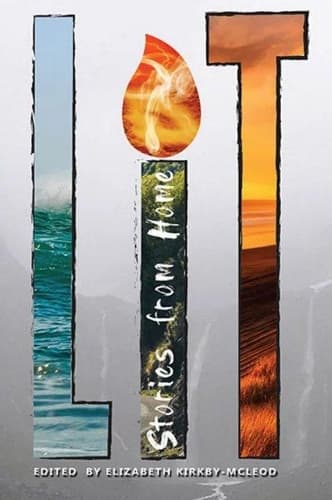Review: Lit - Stories from Home
Reviewed by Greg Fleming
Elizabeth Kirkby-McLeod recalls, in her editor’s introduction, carrying around the 1953 anthology of New Zealand short stories edited by Dan Davin that her father had given her. She praises the collection calling it “a treasure, a capsule of the Aotearoa New Zealand short story of the time” - and includes two writers from it, Frank Sargeson and Katherine Mansfield, in Lit: Stories from Home.
But her focus in Lit - aimed at teachers and students - is on looking “forward to find newer voices.” She believes a collection like this “tells us something of who we think we are at the time, or imagine ourselves to be — not always the same thing.”
And what we find is intriguing, a form in rude health, driven not by literary trends, but by issues of race, culture, displacement and identity. Yes, you’ll find established talents like Owen Marshall, Witi Ihimaera, Patricia Grace and David Hill here (Hill’s heartbreaking Hemingwayesque Free as a Bird is a treasure) but Lit’s most memorable moments give the stage to a new wave of writers; ones who allow us, in its editor’s words, “to glimpse Aotearoa … through the eyes of someone whose experience might not mirror our own.”
It’s a premise perfectly illustrated in opening story Baby Doll by Gina Cole. Cole’s narrator is a young Chinese girl working in a sweatshop sewing Barbie doll costumes, begging for toilet breaks and leaning on cultural fairytales to sustain her: “I see big, life many friend. We laugh. Best, best friend Black Barbie President in America make me Princess.”
Indian-born Rajorshi Chakraborti’s beautiful Out of Zone follows Bangladesh-born Sajida’s attempts to negotiate a house purchase, at the insistence of her husband, in Wellington’s overheated property market. After an unsuccessful negotiation with the trio of wealthy Malaysian sisters who oversee their late mother’s estate, she wanders through the Botanic Gardens and finds herself in the Bangladesh village of her childhood.
She talks in Bengali to a woman in a sari, a woman who resembles her dying mother 11,000 km away. The woman asks where she’s “actually from?” The question gives Sajida pause: “Uh, Pabna, Munshiganj, Wellington. I have lived in all these places. But now Rongotai, near the airport …”
It’s a brilliant piece, Chakraborti granting the reader insight into an immigrant’s experience and the perils of cultural assimilation, in deft, surprising ways.
The juxtaposition of the old and new that Kirkby-McLeod has assembled offers readers a unique perspective on cultural influence. Frank Sargeson’s A Good Boy, published in 1940, a chilling first-person narration from a killer, is followed by crime writer J.P. Pomare’s equally powerful 2017 story, Days of Our Lives, which clearly owes a debt to Sargeson. It begins, “After school I stop by the drain where we found the arm.”
Elsewhere stories by Tracey Slaughter and Russell Booey are urgent, bracing reports from life’s frontlines. Hong Kong born Ting. J. Yiu’s Gutting is a fitting end to this wonderful collection. It examines the psychic cost of inhabiting shifting identities and homelands through a whale stranding on the West Coast: “How ironic that animals called pilot whales could lose their navigation and end up stranded like refugees in an alien land.”
Kirkby-McLeod should be applauded for introducing readers to gifted writers like Chakraborti and Yiu and others. They may well be our next Sargesons and Mansfields. Dan Davin may not recognise the New Zealand many of these writers inhabit, nor the way they write about it, but this collection leaves readers in no doubt that our short story tradition is thriving in their hands.
Reviewed by Greg Fleming
